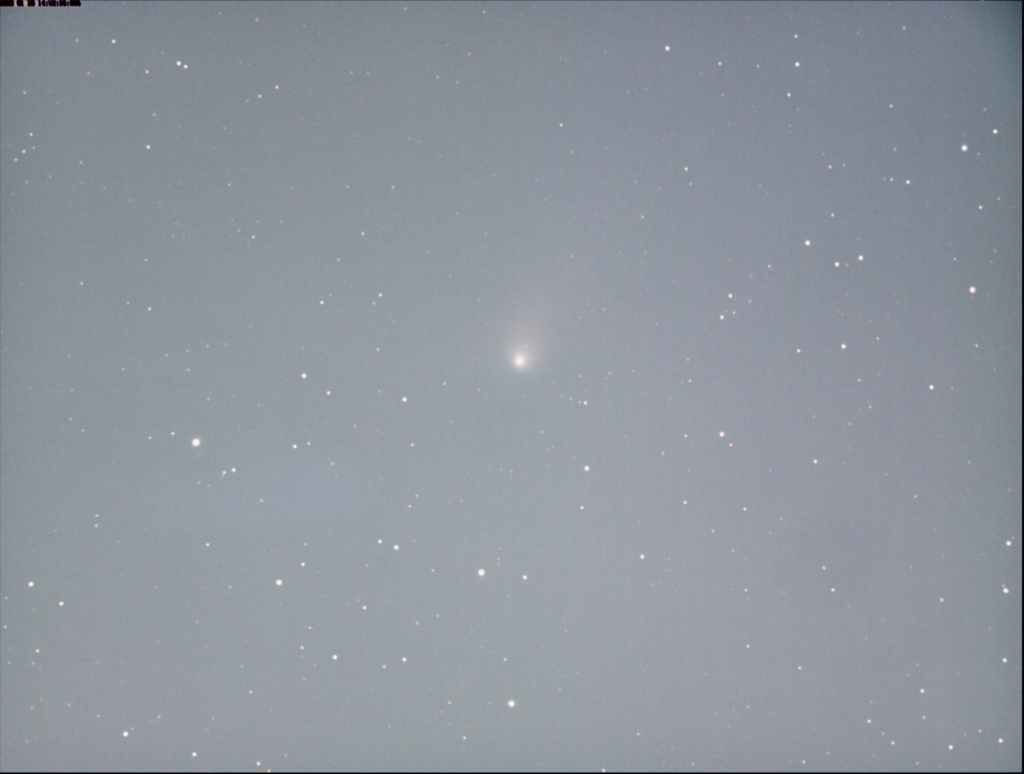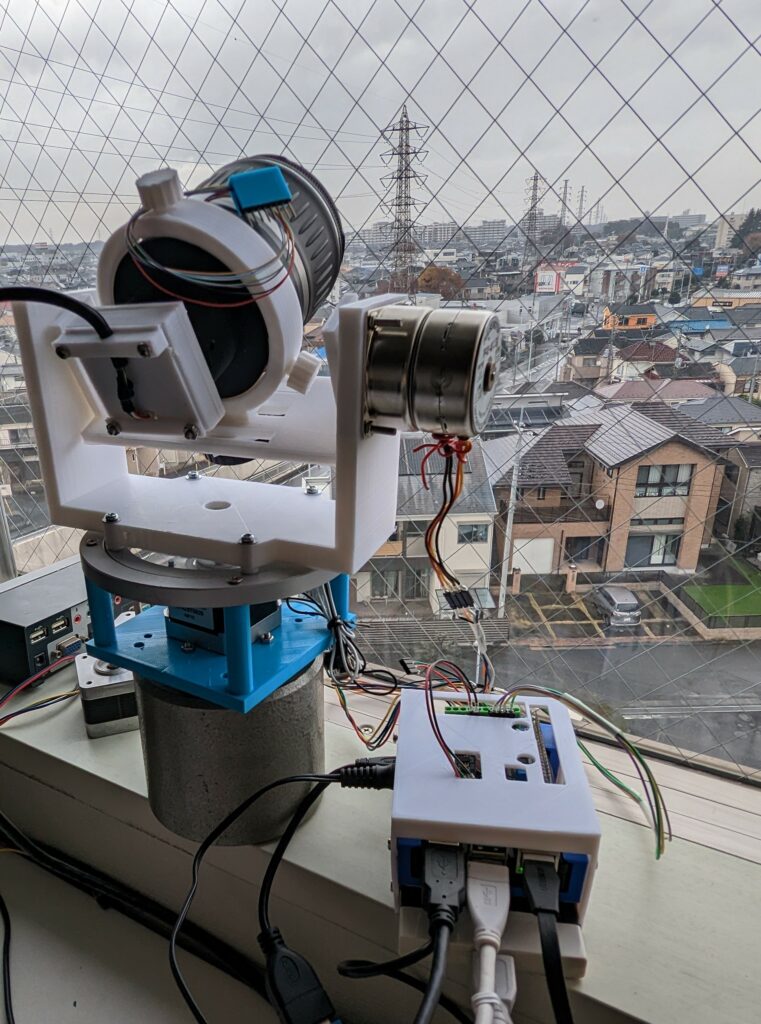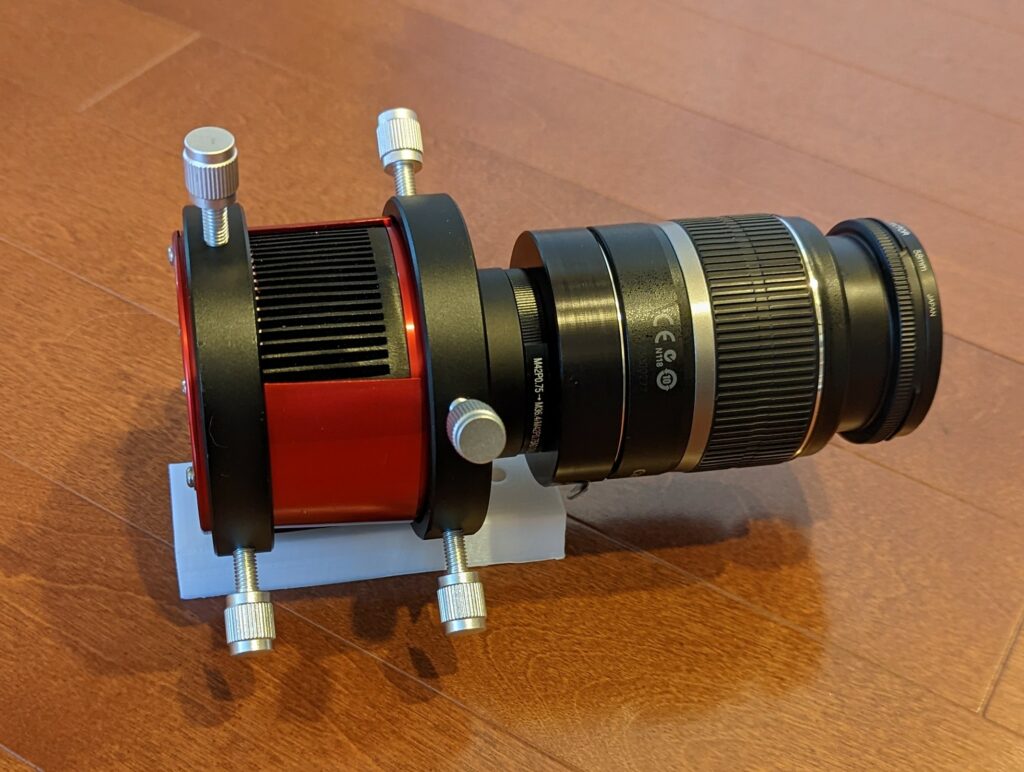1月20日

C/2022 E3(ZTF)彗星 1月17日
1月20日

C/2022 E3(ZTF)彗星 1月17日
コマンドプロンプトで、以下のコマンドを実行する。
powershell start-process cmd -verb runas
Windows10/11の破損したシステムファイルを修復
管理者権限のPowershellから次を実行
sfc /scannow
Windows リソース保護により、破損したファイルが見つかりましたが、それらの一部は修復できませんでした。
オンライン修復の場合、詳細は次の場所にある CBS ログ ファイルに含まれています
windir\ Logs\CBS\CBS.log (たとえば C:\Windows\Logs\CBS\CBS.log)。オフライン修復の場合、
詳細は /OFFLOGFILE フラグによって指定したログ ファイルに含まれています。

import cv2
import time
import pigpio
import datetime
import threading
import os
pi = pigpio.pi()
sMin=0.005
sMax=0.0002
STP1 = 19
DIR1 = 13
EBL1 = 12
STP2 = 18
DIR2 = 24
EBL2 = 4
M=1/32 # microstep
N=200 # stepper
FOV = 20 # Field of view
R=M*360/N # 1-Stepの回転角度
RR= 1 / R # 1度の回転に必要なSTEP数
pX=0
pY=0
cAz = 0
cEv = 0
track = False
mode ='F'
reverse = False
Limit = False
circle = True
th = 170
LowEv,HighEv = 0, 80
RightAz, LeftAz = 0,100
cAz, cEv = 0, 0
oAz, oEv = 55, 45
pi.set_mode(STP1,pigpio.OUTPUT)
pi.set_mode(DIR1,pigpio.OUTPUT)
pi.set_mode(EBL1,pigpio.OUTPUT)
pi.set_mode(EBL2,pigpio.OUTPUT)
pi.set_mode(STP2,pigpio.OUTPUT)
pi.set_mode(DIR2,pigpio.OUTPUT)
delay_Az = 0.0005
delay_Ev = 0.002
def goto(oAz,oEv):
global cAz,cEv,STP1,STP2,DIR1,DIR2,delay_Az,delay_Ev
tA, tE = oAz - cAz, oEv - cEv
rotAz(tA)
rotEv(tE)
def key(k):
global cAz,cEv,STP1,DIR1,STP2,DIR2,th
global track,reverse,circle,dW,dH,Limit
global LowEv,HighEv ,RightAz, LeftAz
if k == ord('b'):
cAz = 0
cEv = 0
elif k == ord('j') or k==81:
rotAz(-0.5625)
elif k == ord('J'):
LeftAz=round(cAz,1)
elif k == ord('k') or k==83:
rotAz(0.5625)
elif k == ord('K'):
RightAz=round(cAz,1)
elif k == ord('h'):
rotAz(-5.625)
elif k == ord('l'):
rotAz(5.625)
elif k == ord('i') or k==82:
rotEv(1)
elif k == ord('I'):
HighEv=round(cEv,1)
elif k == ord('m') or k==84:
rotEv(-1)
elif k == ord('o'):
goto(30,40)
elif k == ord('M'):
LowEv=round(cEv,1)
elif k == ord('a'):
th = th - 2
elif k == ord('s'):
th = th + 2
elif k == ord('t'):
track = not track
elif k == ord('p'):
Limit = not Limit
elif k == ord('r'):
reverse = not reverse
elif k == ord('@'):
print('AzL=',round(LeftAz,1),',AzR=',round(RightAz,1),',EvH=',round(HighEv,1),',EvL=',round(LowEv,1))
elif k == ord('c'):
cAz, cEv = 10, 22
LeftAz, RightAz = -9, 157
HighEv, LowEv = 70, 20
elif k == ord('z'):
tmp=input()
tmp=tmp.split(',')
cAz = float(tmp[0])
cEv = float(tmp[1])
elif k == ord('x'):
tmp=input()
tmp=tmp.split(',')
dW = float(tmp[0])
dH = float(tmp[1])
mH, mW = dH - cEv, dW - cAz
print('Az:',cAz,' Ev:',cEv,' dW:',mW,' dH:',mH)
rotAz(mW)
rotEv(mH)
cAz, cEv = dW, dH
def do_move(N,STP,delay):
#print(N,STP,delay)
for i in range(N):
pi.write(STP,1)
time.sleep(delay)
pi.write(STP,0)
time.sleep(delay)
pi.write(EBL1,0)
def check(Az,Ev):
global LowEv,HighEv ,RightAz, LeftAz
AzR,AzL,EvH,EvL = False,False,False,False
f = False
if Az> RightAz:
AzR, f =True, True
if Az< LeftAz:
AzL, f=True, True
if Ev>HighEv:
EvH, f=True, True
if Ev<LowEv:
EvL, f=True, True
return f,AzR,AzL,EvH,EvL
def rotAz(deg):
pi.write(EBL2,1)
rot(deg,STP2,DIR2, delay_Az)
def rotEv(deg):
pi.write(EBL1,1)
#time.sleep(0.5)
rot(deg,STP1,DIR1, delay_Ev)
def rot(deg,STP,DIR,delay):
global cEv,cAz,LeftAz,LowEv,HighEv
tmp=deg
if tmp<0:
dDIR=1
tmp=-tmp
else:
dDIR=0
if STP==STP2:
N=int(0.5+200*32*tmp/360)
if Limit:
if AzL and (cAz > LeftAz):
N = 0
if AzR and (cAz < RightAz):
N = 0
if N != 0:
cAz=cAz+deg
else:
N=int(0.5+48*120*tmp/360) # 48/360 1/120 gear and Full STEP
if Limit:
if EvL and (cEv<LowEv):
N = 0
if EvH and (cEv>HighEv):
N = 0
if N != 0:
cEv=cEv+deg
pi.write(DIR,dDIR)
do_move(N,STP,delay)
#thread2 = threading.Thread(target= do_move,args=(N,STP,delay,))
#thread2.start()
def jyusin(img):
global W2,H2
mu = cv2.moments(img, False)
try:
x,y= int(mu["m10"]/mu["m00"]) , int(mu["m01"]/mu["m00"])
c=(0,255,0)
focus = True
except ZeroDivisionError:
x = W2
y = H2
c=(0,0,255)
focus = False
return focus,x,y,c
def finish(n):
global writer,track,Limit,f_name
print(f_name,'closed')
writer.release()
new_name=f_name.replace('.avi','-'+str(n)+'.avi')
os.rename(f_name,new_name)
writer ,f_name= None, ""
track = False
Limit = False
goto(55,50)
track = True
Limit = True
fontFace =cv2.FONT_HERSHEY_SIMPLEX
# VideoCapture オブジェクトを取得します
capture = cv2.VideoCapture(0)
#capture.set(cv2.CAP_PROP_FOURCC, cv2.VideoWriter_fourcc(*'mp4v')
capture.set(cv2.CAP_PROP_FRAME_WIDTH, 1920)
capture.set(cv2.CAP_PROP_FRAME_HEIGHT, 1080)
capture.set(cv2.CAP_PROP_FOURCC, cv2.VideoWriter_fourcc(*"MJPG"))
# 幅
W = int(capture.get(cv2.CAP_PROP_FRAME_WIDTH))
# 高さ
H = int(capture.get(cv2.CAP_PROP_FRAME_HEIGHT))
print('Size W:',W,' H:',H)
half = False
W2, H2 = int(W/2), int(H/2)
WW, HH = W2, H2
if W>1024: # resize
W2, H2=int(W/4), int(H/4)
half = True
fourcc = cv2.VideoWriter_fourcc(*'h264')
fourcc = cv2.VideoWriter_fourcc(*'XVID')
#fourcc = cv2.VideoWriter_fourcc(*'mp4v')
writer = None
PATH="/home/mars/pWork/"
AzR,AzL,EvH,EvL = False,False,False,False
f_name=""
i=0
white,blue,red,green=(255,255,255),(255,0,0),(0,0,255),(0,255,000)
config='optrack.ini'
if os.path.exists(config):
f = open(config)
s = f.read()
t = s.split(',')
cAz, cEv, LowEv, HighEv ,RightAz, LeftAz = float(t[0]),float(t[1]),float(t[2]),float(t[3]),float(t[4]),float(t[5])
while(True):
ret, frame = capture.read()
if half:
frame = cv2.resize(frame, dsize=(WW, HH))
now=datetime.datetime.today()
if reverse:
img1 = cv2.cvtColor(cv2.bitwise_not(frame) ,cv2.COLOR_BGR2GRAY)
else:
img1 = cv2.cvtColor(frame ,cv2.COLOR_BGR2GRAY)
# 二値化(閾値100を超えた画素を255にする
ret, img_th = cv2.threshold(img1, th, 255, cv2.THRESH_BINARY)
cv2.imshow('frame2',img_th)
k=cv2.waitKey(1) & 0xFF
key(k)
if k == ord('q'):
break
# 重心検出
focus,x,y,c = jyusin(img_th)
cc = white
if focus:
if track:
i=i+1
if writer is None:
f_name ='video/'+now.strftime("%Y-%m-%d_%H:%M:%S")+'.avi'
writer=cv2.VideoWriter(f_name, fourcc, 15, (WW,HH))
print('Record Start:',f_name)
time_start = time.time()
else:
writer.write(frame)
cc = green
if (time.time() - time_start) >20:
finish(i)
i = 0
else:
if writer is not None:
finish(i)
i = 0
else:
if (writer is not None):
writer.write(frame)
if ((time.time()- time_start)>20):
finish(i)
i = 0
if circle:
cv2.circle(frame, (x,y), 4, color=c, thickness=1)
cv2.circle(frame, (x,y), 10, color=c, thickness=1)
cv2.circle(frame, (x,y), 16, color=c, thickness=1)
f, AzL,AzR,EvH,EvL=check(cAz,cEv)
cf = green
if f:
cf = red
dW = (WW*0.5 - x)*0.001
if track and abs(dW)>0.02:
rotAz(-dW) # cAz = cAz + dW * R
dH = (HH*0.5 - y)*0.001
if track and abs(dH)>0.02:
rotEv(dH) # cEv = cEv + dH*R
text='T:'+str(track)+' L:'+str(Limit)+' '+now.strftime("%H:%M:%S")+ ' TH=' +str(th)+' X='+str(x)+' Y='+str(y)+" F#:"+str(i)+" File:"+f_name
text2="Az:"+str(round(cAz,2))+" Ev:"+str(round(cEv,2))+" F:"+str(f)+" AzL:"+str(AzL)+" AzR:"+str(AzR)+" EvH:"+str(EvH)+" EvL:"+str(EvL)
text3="Az_step:"+str(round(dW,2))+" Ev_step:"+str(round(dH,2)) + " Video Reverse:" + str(reverse)
text4="AzL:"+str(LeftAz)+" AzR:"+str(RightAz)+" EvH:"+str(HighEv)+" EvL:"+str(LowEv)
img = cv2.putText(frame, text, (10,20), fontFace, 0.5,color=cc)
img = cv2.putText(frame, text2, (10,40), fontFace, 0.5,color=cf)
img = cv2.putText(frame, text3, (10,60), fontFace, 0.5,color=cc)
img = cv2.putText(frame, text4, (10,80), fontFace, 0.5,color=cc)
cv2.imshow('frame',img)
print('Done!')
f=open(config,'w')
msg=str(cAz)+','+str(cEv)+','+str(LowEv)+','+str(HighEv)+','+str(RightAz)+','+str(LeftAz)
f.write(msg)
f.close()
capture.release()
if writer is not None:
writer.release()
cv2.destroyAllWindows()
pi.write(EBL1,0)
pi.write(EBL2,0)参照URL: WSL2 USBカメラ+他のUSB機器 2022年09月06日版
USBデバイスの種類によっては、カーネル再構築が必要のようだ。https://zenn.dev/pinto0309/articles/e1432253d29e30
>usbipd wsl list
BUSID VID:PID DEVICE STATE
1-4 03c3:290a ZWO ASI290MC Camera Not attached
1-6 31b2:0010 KT USB Audio, USB 入力デバイス Not attached
1-8 8087:0a2a インテル(R) ワイヤレス Bluetooth(R) Not attached
2-3 05e3:0749 USB 大容量記憶装置 Not attached
4-1 056e:00e7 USB 入力デバイス Not attached
4-2 328f:2015 eMeet Nova, USB 入力デバイス Not attached
5-2 1908:2220 USB 大容量記憶装置, USB2.0 Device, USB 入力デバイス Not attached
5-3 1b1c:1b73 USB 入力デバイス Not attached
5-4 8086:0808 USB PnP Sound Device, USB 入力デバイス Not attacheddeviceのattach
>usbipd wsl attach --busid 4-2
usbipd: info: Using default WSL distribution 'Ubuntu-20.04'; specify the '--distribution' option to select a different one.
>usbipd wsl list
BUSID VID:PID DEVICE STATE
1-6 31b2:0010 KT USB Audio, USB 入力デバイス Not attached
1-8 8087:0a2a インテル(R) ワイヤレス Bluetooth(R) Not attached
1-12 03c3:290a ZWO ASI290MC Camera Not attached
2-3 05e3:0749 USB 大容量記憶装置 Not attached
4-1 056e:00e7 USB 入力デバイス Not attached
4-2 328f:2015 eMeet Nova, USB 入力デバイス Attached - Ubuntu-20.04
5-2 1908:2220 USB 大容量記憶装置, USB2.0 Device, USB 入力デバイス Not attached
5-3 1b1c:1b73 USB 入力デバイス Not attached
5-4 8086:0808 USB PnP Sound Device, USB 入力デバイス Not attached
ビデオデバイス:wsl2_linux_kernel_usbcam_enable_conf
https://github.com/PINTO0309/wsl2_linux_kernel_usbcam_enable_conf
起動しなくなったWSL2を復活させるまでにしたあれこれ
.wslconfigを退避して復帰で救われた! ユーザ/xxxxx/.wslconfig
参考情報 USBカメラの情報をv4l2-ctl取得・設定
Ubuntu 20.04 LTSでUSB接続のWEBカメラを使う
// 利用可能なWEBカメラの一覧を表示しています
$ v4l2-ctl --list-devices
//#デバイスの全ての情報を表示します
v4l2-ctl -d /dev/video2 --all
// 接続しているUSBカメラの全情報出力
$ v4l2-ctl --all
// USBカメラが対応している設定項目一覧を確認するには
$ v4l2-ctl -L
設定の確認は以下で行います。
$ v4l2-ctl -C <設定項目名>
設定は以下で行います。
$ v4l2-ctl -c <設定項目名>=値
解像度とフレームレートの取得
$ v4l2-ctl --list-formats-ext利用ソフト:dump1090-faとpysynscan + 自作のpythonスクリプト
ADSB受信用SDR:RTL-SDR RTL2832U
カメラ制御用経緯台: SkyWatcherのAz-GTi
カメラ:ASI1600MC-COOL + カメラ用レンズ

撮影画像例:距離 10000m程度

おまけ
スマホで航空機を撮影:距離500m程度??
撮影場所、時刻、方向:スマホのGPS情報、加速度センサー等から取得
アメダスは:降水量を観測する観測所は全国に約1,300か所

問題点:
(1)経緯台の回転速度が比較的遅いので、カメラの指向が間に合わないことがある。
(2)航空機までの距離が遠いことが多く、200mm程度の望遠レンズでは、画像から機種の判別は困難
STEP1:ADSBの電波を受信し、航空機のICAOコードと位置(緯度、経度、高度)を取得。
STEP2:航空機の位置(緯度、経度、高度)と、観測場所の緯度、経度から航空機が見える方位と見上げ角度を計算。
STEP3:経緯台のモータを、航空機の方向に向ける。
STEP4:画像を撮影
# -*- coding: utf-8 -*-
from math import *
import time,datetime
import os
import socket
import logging
import synscan
from optparse import OptionParser
PORT = 30003 # Running dump1090-fa
host = '192.168.68.61' #
BUFFER_SIZE = 1024
R_EARTH = 6378137
RAD = 3.14159265 / 180
LAT0,LON0=35.7973, 139.4462
parser = OptionParser()
parser.add_option("-r","--range",action="store",dest="MAX", default=0,type="int",help="Max range")
parser.add_option("-t","--tilt",action="store",dest="TILT_MIN", default=1,type="float",help="Min tilt")
(opts, args) = parser.parse_args()
MAX=opts.MAX
TILT_MIN=opts.TILT_MIN
#MAX = 20000
if MAX == 0:
TEST = True
pH,pT = 0,0
MAX = 50000
print("Test mode")
else:
TEST = False
smc=synscan.motors(udp_ip='192.168.68.200', udp_port=11880)
pH,pT = smc.axis_get_pos(1),smc.axis_get_pos(2)
print('Last PAN,TILT:',pH,pT)
H_MIN ,T_MIN = 0.1, 0.1
def distance(lat1,lon1,lat2,lon2):
lat1,lat2 = lat1*RAD, lat2*RAD
lon1,lon2 = lon1*RAD, lon2*RAD
lat_c = (lat1 + lat2) / 2
try:
dx = R_EARTH*(lon2-lon1)*cos(lat_c)
dy = R_EARTH*(lat2-lat1)
except:
dx,dy = 100000, 100000
pass
return sqrt(dx*dx + dy*dy)
def azimuth(y1,x1,y2,x2):
x1=radians(x1)
y1=radians(y1)
x2=radians(x2)
y2=radians(y2)
deltax = x2 - x1
ans = degrees(atan2(sin(deltax),(cos(y1)*tan(y2)-sin(y1)*cos(deltax))))%360
return ans
Buf = {}
dBuf= {}
T_MAX, L_MAX = 0.5,10
dH, dT = 0, 0
start=time.time()
TGT=None
seq = 0
with socket.socket(socket.AF_INET, socket.SOCK_STREAM) as s:
s.connect((host, PORT))
while True:
str = s.recv(BUFFER_SIZE).decode()
if 'MSG,3' in str:
t = str.split(',')
try:
ID, Lat, Lon, Alt = t[4],t[14],t[15],t[11]
LAT=float(Lat)
LON=float(Lon)
ALT=float(Alt)
except:
LAT, ALT = 0, 0
pass
if LAT>0 and ALT>0:
dist = round(distance(LAT0, LON0, LAT, LON),1)
if dist<MAX:
houi = round(azimuth(LAT0, LON0, LAT, LON),1) + 5 + dH
tilt = round(degrees(atan(ALT*0.3048/dist)),1) + 3 + dT
Buf[ID] ={'TIME':round(time.time(),0),'DIST':dist,'PAN':houi,'TILT':tilt}
dBuf[ID]=dist
else:
pass
if time.time()-start > T_MAX:
now = time.time()
start = time.time()
os.system('clear')
print('---',datetime.datetime.now(),'---','ICAO:',TGT,' PAN:',pH,' TILT:',pT)
for k,v in list(Buf.items()):
last = Buf[k]['TIME']
if now - last > L_MAX:
print('deleted..',k)
del Buf[k]
if k == TGT:
TGT = None
print('TGT:',TGT)
for k,v in Buf.items():
if (TGT is None) or (TGT not in Buf):
TGT = k
print('New target:',TGT)
seq = 1
dH, dT = 0,0
print(k,v)
if TGT is not None and TGT in Buf:
houi, tilt = Buf[TGT]['PAN'], Buf[TGT]['TILT']
#pH,pT = smc.axis_get_pos(1),smc.axis_get_pos(2)
dH, dT = round(pH - houi,1), round(pT - tilt,1)
if (abs(dH)>H_MIN or abs(dT)>T_MIN) and tilt>TILT_MIN and (houi<200 and tilt<80):
pH, pT = houi, tilt
print('*',TGT, houi,'(',dH,')', tilt,'(',dT,')','SEQ:',seq)
seq = seq + 1
if not TEST :
smc.goto(houi,tilt,syncronous=False)
else:
passssh serviceの自動起動設定
https://buzz-server.com/tech/ubuntu-ssh/
echo 'none none rc defaults 0 0' | sudo tee -a /etc/fstab
echo '#!/bin/bash' | sudo tee /sbin/mount.rc
echo 'sudo service ssh start' | sudo tee -a /sbin/mount.rc
sudo chmod +x /sbin/mount.rc$sudo ssh-keygen -A を実行
password認証を有効にするには、/etc/ssh/sshd_configを修正する。
ポート転送の設定PowerShell スクリプト
https://neos21.net/blog/2021/07/20-01.html
if (!([Security.Principal.WindowsPrincipal][Security.Principal.WindowsIdentity]::GetCurrent()).IsInRole("Administrators")) { Start-Process powershell.exe "-File `"$PSCommandPath`"" -Verb RunAs; exit }
$ip = bash.exe -c "ip r |tail -n1|cut -d ' ' -f9"
if( ! $ip ){
echo "The Script Exited, the ip address of WSL 2 cannot be found";
exit;
}
# All the ports you want to forward separated by comma
$ports=@(22,8501,8888);
$ports_a = $ports -join ",";
# Remove Firewall Exception Rules
iex "Remove-NetFireWallRule -DisplayName 'WSL 2 Firewall Unlock' ";
# Adding Exception Rules for inbound and outbound Rules
iex "New-NetFireWallRule -DisplayName 'WSL 2 Firewall Unlock' -Direction Outbound -LocalPort $ports_a -Action Allow -Protocol TCP";
iex "New-NetFireWallRule -DisplayName 'WSL 2 Firewall Unlock' -Direction Inbound -LocalPort $ports_a -Action Allow -Protocol TCP";
for( $i = 0; $i -lt $ports.length; $i++ ){
$port = $ports[$i];
iex "netsh interface portproxy add v4tov4 listenport=$port listenaddress=* connectport=$port connectaddress=$ip";
}
# Show proxies
iex "netsh interface portproxy show v4tov4";
ポート転送の削除 netsh.exe interface portproxy delete v4tov4 listenport=22
Windows FireWallの設定(解放)
https://qiita.com/DR623G/items/20e1d95e25e4ae658a33
netsh advfirewall firewall add rule name="WSL2" dir=in action=allow protocol=TCP localport=22設定の確認
netsh advfirewall firewall show rule name="WSL2" verbose素数を求める
PHP
Counts; 9592
Start: 1665640247.3987, End: 1665640871.2338
Elapsed: 623.83505320549
python
見つかった素数の数は9592 個です。
かかった時間は712.5231149196625秒です。
mars@ps2:~/work $ python3 prime.py
見つかった素数の数は9592 個です。
かかった時間は771.8856158256531秒です。
golang
見つかった素数の数は9592個です。
かかった時間は12.71028914秒です。
月のすぐ左に木星が輝いていたので撮影してみました。

WindowsのEventLogをUbuntuサーバーへ転送して、可視化等の処理を行う手順。
Windowsへnxlogをインストールし、環境に合わせてnxlog.confを編集する。
nxlogのconfig例(json形式で 514/TCPでsyslogとして転送)
参考にした情報:NXLogでWindowsイベントログをsyslog転送してみた
# NXLog Community Edition configuration file
#
# For more information see "C:\Program Files (x86)\nxlog\conf\nxlog.conf"
# or latest version online at https://nxlog.co/docs/nxlog-ce/nxlog-reference-manual.html
# If you experience problems, see https://nxlog.co/community-forum
#### DEFINE ####
define ROOT C:\Program Files\nxlog
define CERTDIR %ROOT%\cert
define CONFDIR %ROOT%\conf
define LOGDIR %ROOT%\data
define LOGFILE %LOGDIR%\nxlog.log
Moduledir %ROOT%\modules
CacheDir %ROOT%\data
Pidfile %ROOT%\data\nxlog.pid
SpoolDir %ROOT%\data
LogFile %LOGFILE%
#### EXTENSION ####
<Extension exec>
Module xm_exec
</Extension>
<Extension json>
Module xm_json
</Extension>
<Extension syslog>
Module xm_syslog
</Extension>
<Extension charconv>
Module xm_charconv
AutodetectCharsets shift_jis, utf-8
</Extension>
<Extension fileop>
Module xm_fileop
<Schedule>
Every 1 week
<Exec>
file_cycle('%LOGFILE%', 4);
</Exec>
</Schedule>
</Extension>
#### INPUT SECTION ####
<Input input_application>
Module im_msvistalog
Query <QueryList><Query Id="0"><Select Path="Application">*</Select></Query></QueryList>
<Exec>
$Message = to_json();
$Hostname = hostname();
</Exec>
</Input>
<Input input_security>
Module im_msvistalog
Query <QueryList><Query Id="0"><Select Path="Security">*</Select></Query></QueryList>
<Exec>
$Message = to_json();
$Hostname = hostname();
</Exec>
</Input>
<Input input_system>
Module im_msvistalog
Query <QueryList><Query Id="0"><Select Path="System">*</Select></Query></QueryList>
<Exec>
$Message = to_json();
$Hostname = hostname();
</Exec>
</Input>
#### PROCESSOR SECTION ####
<Processor buffer_memory>
Module pm_buffer
Type Mem
MaxSize 128000
WarnLimit 16000
</Processor>
#### OUTPUT SECTION ####
<Output output_syslog>
Module om_tcp
Host 192.168.68.73
Port 514
<Exec>
$SourceName = 'NXLog';
$SyslogFacility = 'local0';
$SyslogSeverityValue = '6';
to_syslog_ietf();
</Exec>
</Output>
#### ROUTE SECTION ####
<Route route_application>
path input_application => buffer_memory => output_syslog
</Route>
<Route route_security>
path input_security => buffer_memory => output_syslog
</Route>
<Route route_system>
path input_system => buffer_memory => output_syslog
</Route>
EventIDでフィルタリングする例
define AccountUsage 4740, 4648, 4781, 4733, 1518, 4776, 5376, 5377, \
4767, 4728, 4732, 4756, 4704, 4672, 4624
{ 中略 }
#### INPUT SECTION ####
<Input eventlog>
Module im_msvistalog
<QueryXML>
<QueryList>
<Query Id='0'>
<Select Path='Security'>*</Select>
</Query>
</QueryList>
</QueryXML>
<Exec>
if ($EventID NOT IN (%AccountUsage%)) drop();
$Message = to_json();
$Hostname = hostname();
</Exec>
</Input>Ubuntug側で514/TCPを受信し、WindowsPC(192.168.68.52)から受信した情報に名前(win.log)を付して保存するように設定(rsyslog.conf)
module(load=”imtcp”)
input(type=”imtcp” port=”514″)
:fromhost-ip, isequal, “192.168.68.52” /var/log/win.log
pythonでjson形式のWindows EventLogを一時処理
cat /var/log/syslog | grep -a EventTime の出力を、次のスクリプトでテキスト化
mport sys
import json
import traceback
n=0
for line in sys.stdin:
n=line.find('{"E') # 文字列 {"Eの位置を得る
tmp=line[n:]
m=tmp.find('#') # {"E から # の部分文字列がEventLogの本体
tmp=tmp[0:m]
try:
di = json.loads(tmp)
n=n+1
for k, v in di.items():
print(f'{k}:{v}')
except: # エラー情報の表示(デバッグ用)
t = traceback.format_exc()
print(t)
if tmp!='':
print('-----------------')
print(tmp)
print('-----------------')
print('Total lines:',n)PHPのスクリプト例
<?php
while($line= fgets(STDIN)){
$p=strpos($line,'{"E');
$tmp=substr($line,$p);
$p=strpos($tmp,'#');
$json=substr($tmp,0,$p);
#echo "$json\n";
$lines=json_decode($json);
foreach ($lines as $key => $var){
echo "$key,$var\n";
}
}
?>イベントIDを指定
<Input eventlog>
# Uncomment im_msvistalog for Windows Vista/2008 and later
Module im_msvistalog
Query <QueryList>¥
<Query Id=”0″>¥
<Select Path=’Security’>*[System[(EventID=’4663′) ]]</Select>¥
<Select Path=’Security’>*[System[(EventID=’4656′) ]]</Select>¥
<Select Path=’Security’>*[System[(EventID=’4658′) ]]</Select>¥
</Query>¥
</QueryList>
# Uncomment im_mseventlog for Windows XP/2000/2003
# Module im_mseventlog
</Input>STEP-1 pythonスクリプト(detectMETEORa.py)でIPカメラから画像を取得し、動体検知のアルゴリズムを中心とした処理で、流星らしい動画(avi形式)を保存する。
STEP-2 記録した個々の動画をstreamlitスクリプト(play.py)でGUI操作で再生し、目視で流星と判断した動画について、COPYボタンをクリックして、1個のaviファイルから1枚のjpg画像を比較明合成アルゴリズムで生成し、同時にavi形式の動画からh264形式の動画(mp4形式)へ変換して保存する。
STEP-3 jpgファイルとmp4ファイルを、Webブラウザーでインタラクティブに閲覧できるよう、あらかじめ用意したフォルダーへCopyする。
ブラウザーで閲覧するためのphpコード ▶ボタンをクリックして、表示されている画像の動画を再生することが可能です。表示対象の画像を月単位で選択できます。
<?php
$day= new DateTime();
if (isset($_POST['month']) && ($_POST['month']!="")){
$month=$_POST['month'];
$f_month=str_replace("-","",$month);
} else {
$month="";
}
echo "<div>";
echo "<H2>動画を再生するには、各画像左下の再生ボタンをクリックして下さい。</H2>";
echo "<LI>画像上へマウスオーバーするとファイル名を表示します。<BR>";
echo "ファイル名[カメラ名_検知フレーム数_総フレーム数_YYYYMMDD_HHmmSS.mp4]<BR>";
echo "<form method =\"POST\">\n";
echo "<BR><LABEL Date>月を変更するには年月欄の右端をクリックしてください。</LABEL>";
echo "<input type=\"month\" name=\"month\" value=$month>";
echo "<input type =\"submit\" value =\"表示\">";
echo "</form></dev>";
//echo "$f_month<BR>\n";
$images = glob('meteor/COMP/*jpg');
$n=0;
foreach($images as $v) {
if (strpos($v,$f_month)) {
$tmp=explode(".",$v);
$mp4=$tmp[0].".mp4";
$mp4=str_replace("COMP","BEST2",$mp4);
//echo "$mp4<BR>";
$tmp=explode("/",$mp4);
$title=$tmp[2];
$msg="<video controls muted title=$title width='480' height='280' src=$mp4 poster=$v></video>";
echo $msg;
if ($n % 2 == 1){
echo "<BR>\n";
}
$n++;
}
}
?>